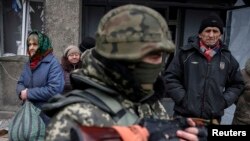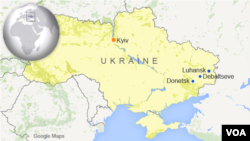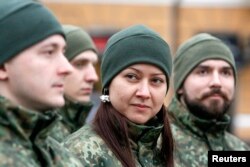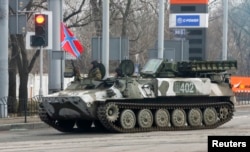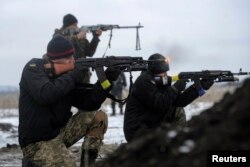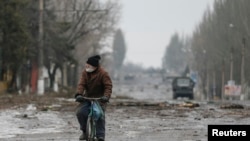Editor's note: VOA’s London-based senior foreign correspondent, Al Pessin, spent six days in eastern Ukraine last week reporting on the Ukrainian military, frontline villages and towns, refugees and efforts to care for wounded troops.
A thick layer of ice and a thin layer of snow cover much of eastern Ukraine. But it’s melting, with temperatures most days unseasonably high.
Experts say that enabled the Russian-backed rebels to launch their expected spring offensive early, overrunning Ukrainian defenders at the Donetsk airport, and pushing them back all along the former cease-fire line.
And intense fighting continues.
Last Sunday morning, several ambulances carrying seriously wounded Ukrainian troops arrived in short order at Central Hospital in the city of Artemivsk, 40 kilometers or almost 25 miles from the front line.
A trauma doctor, who identified himself only as Nikolai, spoke on camera, but with his surgical mask on to hide his face. "I just left the operating room," he said. "We did an amputation of a lower leg. We cut the soldier’s leg off. They drove onto an anti-personnel mine when they were evacuating wounded."
One of the ambulance drivers, a National Guard private named Vasyl, wouldn’t say where he had just come from, for security reasons. But he said, "From one place I brought a dead body, and from another two wounded. These are hard days."
Lives disrupted
Tens of thousands of people have fled the battlefront, including 15-year-old Anya, who, along with her parents, attended a church service for refugees and their hosts in Artemivsk last Sunday. "We hope, we pray, that our house will stay in one piece," she said. "We hope to see our friends again."
Anya tapped her smartphone with some frustration. She said her friends back home don’t have much cell service or much electricity to charge their phones. And when she does reach them, they report daily shelling.
She is also concerned that if her parents can’t find work in overcrowded Artemivsk, they may have to move again. "It’s very stressful for me," she said. "I just managed to fit in with my new classmates. It’ll be really hard to move to a third school."
Ukraine military regroups
In recent weeks, the Ukrainian military has regrouped, and has been holding the well-armed and reinforced rebels back in many areas, while taking heavy casualties. Troops have even held the nearly surrounded town of Debaltseve through a two-week-long siege.
The Ukrainians said they captured enemy troops including Russian soldiers, and also criminals, who they said were given the choice of prison or service on the Ukrainian front.
Farther west of the battlefield, both concern and spirits are high, with many people vowing that the rebels will not take the area again, as they did last spring at the start of the rebellion. The Ukrainian government and military were caught by surprise. But they pushed the rebels out of most of Donetsk and Luhansk regions in the summer.
Everyday pursuits amid peril
Homemaker Alyona and her husband went to the central square of the large northern Donetsk city of Kramatorsk last Saturday so their young daughter could have a pony ride and feed the pigeons. They crouched down to the birds in the shadow of a huge statue of Lenin, his trousers painted over in Ukrainian blue and yellow.
"I’m anxious," Alyona said. "But there is hope. I think there will be a rebirth in this area. Most important is that we all work together."
Walking through the square, retired pipefitter Vasily provided some bravado. "We are not afraid," he declared, "because now we have a good garrison in Kramatorsk." Referring to the rebels, he added, "May they never return!"
Local support for rebels
But the strong pro-Ukrainian feelings expressed by most people are not universal. Many local residents support the rebels, feel culturally close to Russia, and fear Ukraine’s turn toward what some fear is a decadent and possibly fascist West.
In the town of Papasna, in Luhansk, just 13 kilometers from the front line, several residents in one neighborhood that has taken shelling cursed at Ukrainian officials and foreign reporters last week. They told a team of journalists to go home and stop interfering in their affairs. They said the same to the officials representing their government in Kyiv.
The staunchly pro-Ukraine mayor, Yuriy Onishenko, said about 40 percent of the town’s residents supported the rebels last summer, but that has fallen to 30 percent today – a sharp drop, but still a substantial number.
He said some of them send him text messages on a daily basis. "One of the separatist organizers in Papasna writes, ‘We’ll gouge your eyes out,’” he said.
Numerous divisions
In Artemivsk on Sunday, several dozen women gathered in the rain-drenched town square to protest the Ukrainian government’s conscription program. Under a canopy of umbrellas, they told VOA they don’t want their sons to be forced to fight against Russia. They said if Kyiv people want a revolution and a war, they should send their sons to fight.
Still, this is not an east/west or ethnic-Ukrainian/Russian divide. Support for one side or the other varies from village to village, neighborhood to neighborhood, even house to house. Many people have mixed ancestry. And throughout Ukraine, and particularly in this region, many Ukraine supporters are Russian speakers. (It’s much harder to find rebel supporters who primarily speak Ukrainian.)
The prisoner-exchange negotiator for the Ukrainian Security Service, Yury Tandit, said, "We also speak Russian, lots of us are of Russian origin. We don’t want to be liberated. We are citizens of Ukraine. We want this area liberated from those who came into foreign territory."
The approaches to the front-line towns are guarded by Ukrainian troops at a network of checkpoints, and traffic yields to long military convoys heading east with troops, armored vehicles and heavy weapons. Ambulances with sirens screaming weave through. Cars packed with entire families and their most important belongings head west, as do buses with children being sent to safety in shelters or with relatives.
"We sent our child out, but it hurts so much," said Olga, a city worker in Papasna.
Young soldiers at the checkpoints look tense, while military spokesmen speak confidently, as expected.
Press officer Oleg Tikhov of the Ukrainian National Guard said, "The situation is continuously difficult. But the troops’ morale is good and no one will surrender his position."
Ukrainians repeat call for aid
But the Ukrainians know they cannot win as long as Russia supplies arms and men to the rebels.
The newly-appointed governor of the Donetsk region, Ukrainian Army General Alexander Kihtenko told VOA, "We really need military aid today, including communication and reconnaissance equipment, and other modern weaponry, probably anti-tank weapons."
“If it was just the terrorists, it would have been over a long time ago,” said combat command spokesman Lieutenant Colonel Leonid Matyukhin of the Ukrainian Marines. "If the world would not pretend that it doesn’t see anything, this would have been over a long time ago."
Western officials would say they have not been "pretending," but they have been seeking every way possible to end the conflict short of sending weapons to Ukraine. They have imposed economic sanctions that have helped push the Russian economy into recession, and put strong international pressure on President Vladimir Putin.
But U.S. President Barack Obama is reported to be reconsidering whether to send defensive weapons to Ukraine.
Impact of lethal aid debated
There is concern such a move could escalate the conflict, but reports indicate that more and more U.S. officials, and influential former officials, as well as many members of Congress believe the weapons would raise the cost to Putin in a stark and different way, and might convince him to back off in eastern Ukraine.
(Any hope of recovering Crimea, which Russia occupied and annexed nearly a year ago, appears slim at best, although the move is also not going to be officially recognized.)
Diplomatic efforts renewed
Just the prospect of American weapons flowing to Ukraine has sparked a new round of diplomacy. French and German leaders traveled to Kyiv and Moscow this week with a peace plan aimed at making such a move unnecessary. They want a return to the agreement reached in September.
But that left Ukrainian artillery within range of rebel strongholds. Russia opposes returning to that situation, and so far has not been willing to agree on a new cease-fire, even one that might accept at least some of the rebels’ recent gains.
At Kyiv’s International Center for Policy Studies, analyst Yaroslav Voitko said, "It’s a matter of principle. We will not agree to any further captures of our territories, but some compromise can be reached in the meantime on the cease-fire and stopping hostilities."
As for American weapons, Voitko said they would be welcomed and could shorten the conflict. But he added, Putin’s "reactions could not be predicted – and anything, unfortunately, is possible."
While the diplomacy continues, so does the war.
The dead, the wounded and the refugees continue to move westward. The Ukrainian military continues to try to hold on. And the prospects for more peaceful outings to feed the pigeons in Donetsk and Luhansk towns appear to dim a little every day.




